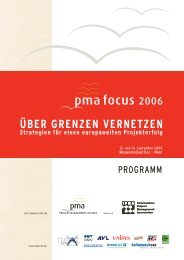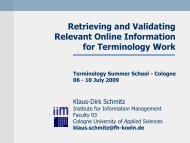Termine ~ Events - TermNet
Termine ~ Events - TermNet
Termine ~ Events - TermNet
You also want an ePaper? Increase the reach of your titles
YUMPU automatically turns print PDFs into web optimized ePapers that Google loves.
Format des propositions<br />
Toute personne souhaitant présenter une communication en rapport avec ce thème<br />
est invitée à faire parvenir sa proposition à Georges Bastin<br />
(georges.bastin@umontreal.ca), Département de linguistique et de traduction,<br />
Université de Montréal, et à Marco A. Fiola (mfiola@ryerson.ca), Département de<br />
français et d'espagnol, Université Ryerson, au plus tard le 22 septembre 2006.<br />
Outre les renseignements suivants, votre proposition comprendra le titre de votre<br />
communication, un résumé ne dépassant pas 300 mots EN PLUS d'un résumé abrégé<br />
d'au plus 150 mots. Le comité du programme se réserve le droit de rejeter toute<br />
proposition incomplète ou ne cadrant pas avec le thème.<br />
Nom :<br />
Affiliation professionnelle (Université, Faculté et Département, le cas échéant) :<br />
Statut (professeur titulaire, agrégé, adjoint, étudiant à la maîtrise ou au doctorat,<br />
etc.) :<br />
Adresse postale :<br />
Adresse électronique :<br />
Numéro de téléphone :<br />
Numéro de télécopieur :<br />
Diplômes (intitulé, année et établissement) :<br />
La référence bibliographique de trois publications récentes :<br />
XXth CONGRESS OF THE CANADIAN ASSOCIATION FOR TRANSLATION STUDIES<br />
UNIVERSITY OF SASKATCHEWAN, SASKATOON MAY 26 TO MAY 28 MAI 2007<br />
TRANSLATOR FORMATION: PEDAGOGY, EVALUATION, AND TECHNOLOGIES<br />
In 1981, Eugene Nida published his now famous paper, Translators are born, not<br />
made, and by doing so initiated a controversy among translator educators. Twentyfive<br />
years later, efforts by translation scholars to identify the knowledge and skills<br />
required to translate tend to prove Nida wrong and demonstrate that it is realistic to<br />
teach–and possible to learn–how to translate. From conventional lectures to distance<br />
education, translator education is the object of a large number of strongly defended<br />
didactic positions and pedagogical approaches. However, one issue seems to rally all<br />
schools of thought: how difficult it is to learn this artistic science/scientific art/craft<br />
called translation. While the artistic and emotive aspect of translation remains<br />
subjective, no effort is spared to ensure that the scientific or cognitive aspect of<br />
translation competence become resolutely objective to the point of making it possible<br />
to quantify and evaluate. The role of quality assessment in translation is increasingly<br />
acknowledged–Europe is working on the implementation of a standard for quality<br />
translation services–but docimological aspects of translation have yet to attract the<br />
full attention they deserve. Because translation learning must be assessed, one must<br />
define the difficulties associated with translation quality assessment for pedagogical<br />
purposes. Are currently used docimological methods designed to serve both teachers<br />
and learners? Do they meet the needs of the curricula?<br />
Why is there such a gap between academic requirements and workplace<br />
requirements with respect to translation quality and translating competence? How<br />
can we explain the gap between pragmatic formation and on-the-job initial training<br />
(such as that provided in co-op programs)?




